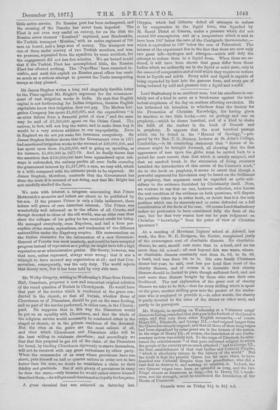Lord Shaftesbury is an excellent man, but his excellence is
cer- tainly not of a kind to serve as a breakwater against the intel- lectual scepticism of the day on matters affecting revelation. He has intimated his intention to withdraw from the Society for the Promotion of Christian Knowledge, for having given its sanction to two little books,—one on geology and one on prophecy,—which he deems heretical, and of a kind to shake the faith of the readers in the book of Genesis and in prophecy. It appears that the most heretical passage which can be found in the "Manual of Geology,"—pre- pared by the Rev. T. G. Bonney, lecturer at St. John's College, Cambridge,—is its concluding statement that " dozens of in- stances might be brought forward, all showing that the first appearance of man upon the globe must be carried back to a period far more remote than that which is usually assigned, and that no marked break in the succession of living creatures heralded the introduction of this crown of the Creator's work." As to the book on prophecy, it seems to assert that though a powerful argument for Revelation may be based on the fulfilment of prophecy, that argument must be regarded as quite sub- sidiary to the evidence furnished by Christianity itself. Now, we venture to say that no one, however orthodox, who knows the real condition of the evidence on both questions, will dispute the position taken up in either book, or doubt that it ia the only position which can be sincerely and ex animo defended on a full consideration of the facts of the case. Of course Lord Shaftesbury makes no pretension to have considered fully the facts of the case, but for that very reason how can he pass judgment on Christian " knowledge " from the point of view of Christian ignorance ?






































 Previous page
Previous page